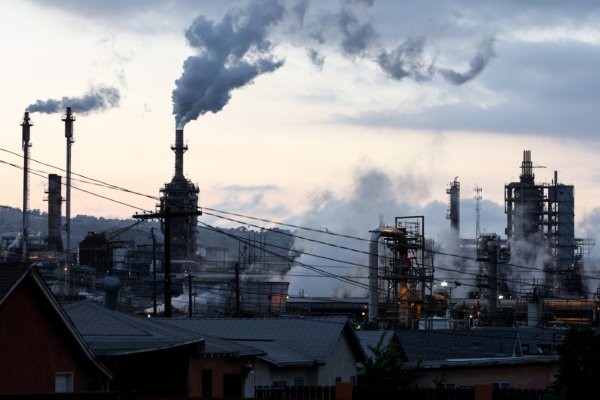On October 16th, Phillips 66, an oil giant based in Houston, Texas, announced its plans to close its refinery in the Los Angeles area of California in the fourth quarter of 2025.
Approximately 900 people are involved in the operation of this refinery, including around 600 employees and several hundred contractors.
“We understand the impact this decision will have on our employees, contractors, and the community,” said Mark Lashier, CEO of Phillips 66, in a statement. “We will work to help and support them through this transition.”
Lashier mentioned the “long-term sustainability” uncertainty of the plant’s operation and stated that the refinery is being influenced by market dynamics.
Regarding the reason for closing the refinery, a spokesperson for Phillips 66 told Epoch Times that the statement referred to the lower profitability of the facility compared to the company’s other assets, rather than a response to California government’s regulatory structure or the newly signed bill X2. X2 grants the California Energy Commission authority over inventory and maintenance plans.
The spokesperson stated that they hope to continue being a trusted and thoughtful partner for the state government. The decision is based on a variety of considerations.
The refinery ranks seventh in California and can refine about 139,000 barrels of crude oil per day. According to the latest data from the California Energy Commission as of September 2023, this output represents over 8% of the California crude oil market. The company stated that these crude oil can produce approximately 85,000 barrels of gasoline per day, as well as tens of thousands of other fuels.
During a legislative hearing in September, lawmakers and government officials discussed the prospect of refineries leaving California.
“What would happen if we lose one or two more refineries due to some issues?” Democratic State Assemblywoman Blanca Rubio asked during the hearing on September 26. “The industry is also saying that if these regulations keep coming at us, some refineries are going to say, ‘It’s not worth staying here, we’re out.'”
Vice Chairman of the Energy Commission, Siva Gunda, stated that losing a refinery could have a negative impact on the market, “Supply will definitely decrease, and we will face a demand.”
It is currently unclear how the production loss of the Los Angeles refinery will affect supply or what impact it will have on oil prices.
The company has committed to working with the state government to continue supplying the market and meeting demand using resources from its other refineries near San Francisco and its refining network.
“We do not intend to exit California,” the spokesperson told Epoch Times. “Phillips 66 still owns and operates midstream assets and produces renewable diesel, which consumers can find at our branded retail sites across the state. We look forward to finding new ways to serve the California market.”
Despite the decrease in refining capacity in California, the company plans to employ various strategies to continue operating in the state.
“At present, we will focus on safely and reliably operating the Los Angeles refinery,” the spokesperson said. “Once we cease operations, we will work with California to provide transportation fuels for the market, including imported gasoline and renewable fuels.”
According to the statement, Phillips 66 has been collaborating with real estate development companies Catellus Development Corporation and Deca Companies to assess the future use of a 650-acre plot in Wilmington and Carson, California.
An industry representative organization stated that due to reduced supply, oil prices will ultimately rise.
The Government Affairs and Regulatory Director of the California Fuel and Convenience Alliance, Alessandra Magnasco, told Epoch Times in an email, “This is what happens when our leaders are more concerned with political theater than solving real problems.”
He stated that California’s high oil prices are not mysterious. Operating gas stations in California entails high indirect costs, compliance with costly environmental regulations; now with reduced market supply, every Californian will end up paying a higher price in this government-created energy crisis.
Magnasco noted that California policies have caused problems for the industry. “We recognize the challenges faced by companies like Phillips 66 as they try to operate in the most heavily regulated energy environment globally.” He said, “The closure of refineries is a direct result of California policies, which make it increasingly difficult to maintain and expand essential infrastructure.”
Insiders in the oil industry suggest that concerns about regulations and operating costs may have partially influenced the decision to close the refinery, which is also reflected in lower profit margins.
Tom Kloza, founder of Oil Price Information Service based in Rockville, Maryland, stated in a social media post on the 16th: “With California launching what amounts to a war on refiners, the connection between those dots is hard to miss.”
Chief Petroleum Analyst of the company, Denton Cinquegrana, commented shortly after the announcement of the refinery closure on the X platform, saying, “I don’t think they’ll be the last one. The hostilities between the California government and refiners are still ongoing.” He believed that considering California’s regulatory environment, this news might prompt more refineries to close.
A proposal expected to be discussed at a California Air Resources Board meeting on November 7 and 8 could also impact oil prices in California. The proposal aims to revise California’s low carbon fuel standard. Some analysts suggest this could lead to a short-term increase in oil prices by up to 65 cents.
Danny Cullenward, Vice Chair and lawyer of the California Independent Emissions Market Advisory Committee, stated in a report published on November 7 by the Colemann Energy Policy Center at the University of Pennsylvania: “The impact on retail gasoline prices could reach up to $0.65 per gallon in the short term, rise to $0.85 per gallon by 2030, and approach $1.50 per gallon in 2035.”
As of press time, the Governor’s office had not responded to Epoch Times’ request for comment.

